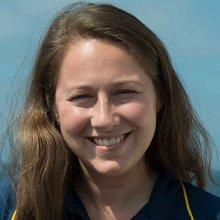
Roxanne Beinart
Tell us about your work / research. What kinds of things do you do?
I am interested in understanding how symbiotic microorganisms impact ecosystems. It's becoming clear that all organisms associate (i.e., are symbiotic), in some way, with microbes, and that these microbes often provide critical functions for their hosts. For example, microbial symbionts can produce important nutrients, detoxify harmful substances, or assist host metabolism. Though tiny, microbial symbionts have the potential to fundamentally affect how their host interacts with other organisms and with the environment. Furthermore, microbial symbiont populations can be very large and very active, and therefore are likely to be especially important to ecosystem processes like nutrient cycling. I use physiological experiments, ecological surveys, and modern gene-based analyses to investigate how microbial symbionts affect their hosts and interact with the environment. I mainly work on animal-bacterial symbioses from deep-sea habitats like hydrothermal vents, as well as protist-archaeal symbioses from various anoxic aquatic habitats.
What sparked your initial interest in your career?
I always wanted to be a scientist and became interested in microbiology as an elementary school student when I first saw the growth of bacteria on petri plates (from seemingly nothing came something!). I initially was interested in waging war against the microbes that harm us as a CDC scientist. In college, I realized that the vast majority of microbes that are around us (and they really are all around us) help us in some way, either by directly benefiting our health or by being vital elements of the planet's ecosystems. My attention, therefore, swung entirely towards an interest in understanding how microbes can directly benefit other organisms. I now focus on a few ecosystems where the dominant organisms have critical and conspicuous relationships with microbes (deep-sea vents and cold seeps, and anoxic aquatic habitats). Symbiotic relationships with microbes are so important in these areas that they are relatively easy to study and understand.
Who influenced you or encouraged you the most?
My parents always encouraged me to go as far as I could in my field, and my lab mentors were incredibly important to my progress.
What element of your work / study do you think is the most fascinating?
Some of my work involves conducting physiological experiments with live organisms. For the work I do with deep-sea hydrothermal vent animals, we have to keep them in high-pressure aquaria made out of titanium, under pressures generated by industrial-strength pumps that can reach 100X the pressure in a car tire!
What other jobs led you to your current career?
Since I've always known I wanted to be a biologist, all of my jobs and training have been in this field. That being said, a lot of my work depends on other types of knowledge. For example, I never expected to need to know about tubing and tube fittings, but it turns out these things are especially important to the high-pressure physiological experiments that I conduct with deep-sea animals, and to handling cultures of anaerobic microorganisms. For the work I do, experience with engineering, plumbing, carpentry, electrical, and computer science would be helpful!
What are your degrees and certifications?
Bachelor of Science in Biology (Microbiology) - Cornell University 2006
Ph.D. in Biology - Harvard University 2013
What are your hobbies?
In my free time, I love doing anything outside (swimming, hiking, canoeing), refinishing old furniture, and reading. I also love houseplants and orchids.
What advice would you give to someone who wants to have a career like yours?
My advice is to never be shy about asking. Ask about job opportunities, ask others for advice, ask for help. It NEVER hurts to ask. The more you talk to people about your interests, what you want, and what you can do, the more doors will open.
How did you get involved with the Nautilus Exploration Program? How did you get on the ship?
I collaborate with other scientists that are involved in the current cruise and was invited aboard by them.
Expeditions
Roxanne participated in the following Ocean Exploration Trust expeditions:
